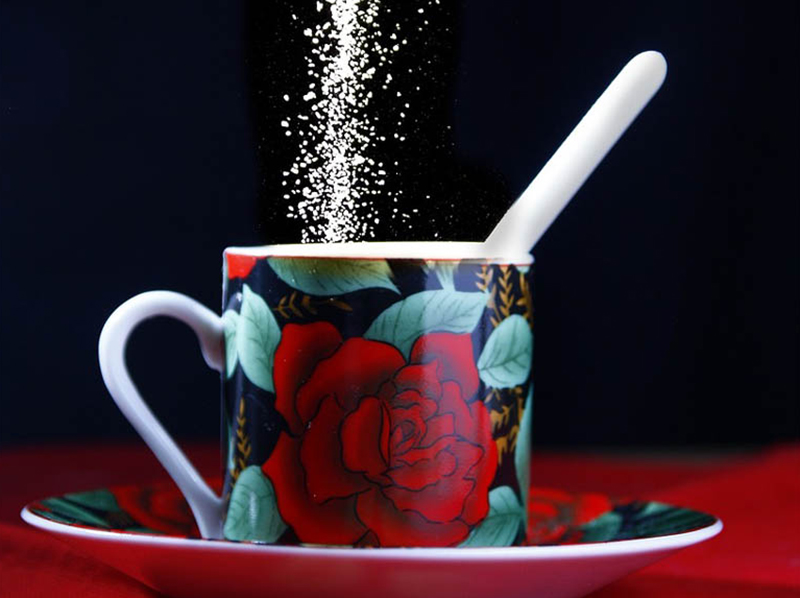 Artificial Sweetener
Artificial Sweetener
Study warns that chemical found in common artificial sweetener can damage DNA
A new study finds a chemical formed when we digest a widely used sweetener is “genotoxic,” meaning it breaks up DNA. The chemical is also found in trace amounts in the sweetener itself, and the finding raises questions about how the sweetener may contribute to health problems.
At issue is sucralose, a widely used artificial sweetener. Previous work by the same research team established that several fat-soluble compounds are produced in the gut after sucralose ingestion. One of these compounds is sucralose-6-acetate.
“Our new work establishes that sucralose-6-acetate is genotoxic,” says Susan Schiffman, corresponding author of the study and an adjunct professor in the joint department of biomedical engineering at North Carolina State University and the University of North Carolina at Chapel Hill. “We also found that trace amounts of sucralose-6-acetate can be found in off-the-shelf sucralose, even before it is consumed and metabolized.
“To put this in context, the European Food Safety Authority has a threshold of toxicological concern for all genotoxic substances of 0.15 micrograms per person per day,” Schiffman says. “Our work suggests that the trace amounts of sucralose-6-acetate in a single, daily sucralose-sweetened drink exceed that threshold. And that’s not even accounting for the amount of sucralose-6-acetate produced as metabolites after people consume sucralose.”
For the study, researchers conducted a series of in vitro experiments exposing human blood cells to sucralose-6-acetate and monitoring for markers of genotoxicity.
“In short, we found that sucralose-6-acetate is genotoxic, and that it effectively broke up DNA in cells that were exposed to the chemical,” Schiffman says.
The researchers also conducted in vitro tests that exposed human gut tissues to sucralose-6-acetate.
“Other studies have found that sucralose can adversely affect gut health, so we wanted to see what might be happening there,” Schiffman says. “When we exposed sucralose and sucralose-6-acetate to gut epithelial tissues – the tissue that lines your gut wall – we found that both chemicals cause ‘leaky gut.’ Basically, they make the wall of the gut more permeable. The chemicals damage the ‘tight junctions,’ or interfaces, where cells in the gut wall connect to each other.
“A leaky gut is problematic, because it means that things that would normally be flushed out of the body in feces are instead leaking out of the gut and being absorbed into the bloodstream.”
The researchers also looked at the genetic activity of the gut cells to see how they responded to the presence of sucralose-6-acetate.
“We found that gut cells exposed to sucralose-6-acetate had increased activity in genes related to oxidative stress, inflammation and carcinogenicity,” Schiffman says.
“This work raises a host of concerns about the potential health effects associated with sucralose and its metabolites. It’s time to revisit the safety and regulatory status of sucralose, because the evidence is mounting that it carries significant risks. If nothing else, I encourage people to avoid products containing sucralose. It’s something you should not be eating.”
The paper, “Toxicological and pharmacokinetic properties of sucralose-6-acetate and its parent sucralose: in vitro screening assays,” is published in the Journal of Toxicology and Environmental Health, Part B. The paper was co-authored by Troy Nagle, Distinguished Professor of Biomedical Engineering at NC State and UNC and Distinguished Professor of Electrical and Computer Engineering at NC State; Terrence Furey, professor of genetics and biology at UNC; and Elizabeth Scholl, a former researcher at NC State who is currently at Sciome LLC.
The authors have no conflicts of interest. The research was done with support from the Engineering Foundation at NC State.
Support Our Journalism
We cannot do without you.. your contribution supports unbiased journalism
IBNS is not driven by any ism- not wokeism, not racism, not skewed secularism, not hyper right-wing or left liberal ideals, nor by any hardline religious beliefs or hyper nationalism. We want to serve you good old objective news, as they are. We do not judge or preach. We let people decide for themselves. We only try to present factual and well-sourced news.







